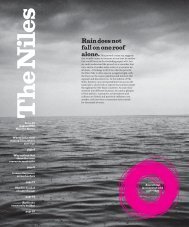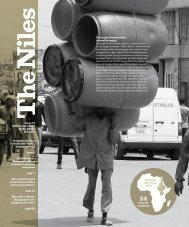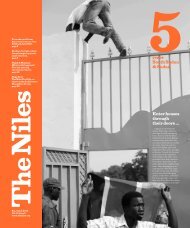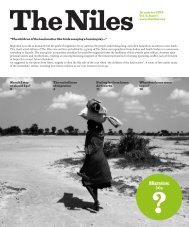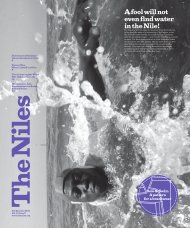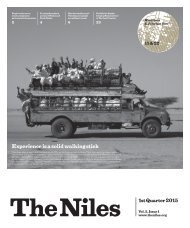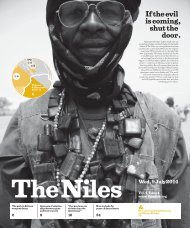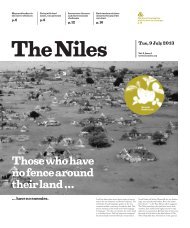When deeds speak, words are nothing
Speaking about sustainable development is easy. Acting sustainably is another matter. And now the evidence is unequivocal: Mankind’s impact on nature is causing the climate to change rapidly and drastically, threatening the environment and the very resources we need to survive. Aware that humanity is careening close to the edge, The Niles correspondents set out to explore where and how people in the Nile Basin region rethink. So much of their findings for now: We are an endlessly innovative species. Cooperation is our superpower. When deeds speak, words are nothing.
Speaking about sustainable development is easy. Acting sustainably is another matter. And now the evidence is unequivocal: Mankind’s impact on nature is causing the climate to change rapidly and drastically, threatening the environment and the very resources we need to survive. Aware that humanity is careening close to the edge, The Niles correspondents set out to explore where and how people in the Nile Basin region rethink. So much of their findings for now: We are an endlessly innovative species. Cooperation is our superpower. When deeds speak, words are nothing.
You also want an ePaper? Increase the reach of your titles
YUMPU automatically turns print PDFs into web optimized ePapers that Google loves.
re<think
policies
& the way
we invest
Lake Edward: My fish,
your fish, our fish
Cooperation policies and coordinated
patrols on Lake Edward, between
the Democratic Republic of Congo
and Uganda, give hope for sustainable
fisheries to enable current and
future generations to share the
water resource.
“A natural bank
for present and
future generations.”
Congolese fishermen’s canoes
seized in Uganda.
Photo: The Niles / Tuver Wundi
10
A
cross the Nile Basin, population growth and,
in many areas, the high population density are
piling pressure onto land and water resources.
Climate change, the overuse of resources,
declining fish stocks, invasive species, habitat
degradation, and pollution are the region’s
scourge, and the Lake Edward basin is a case
in point.
Lake Edward is the smallest among the
African Great Lakes (AGL), with a surface area
of 2,325 square kilometres. Its basin includes
the smaller (250 square kilometres) but highly
productive Lake George, connected by the
Kazinga channel. The lake is shared between
Uganda (29 percent) and the Democratic
Republic of Congo (71 percent).
On the DRC side, Lake Edward is an integral
part of the Virunga National Park, a UNESCO
World Heritage Site and RAMSAR Convention
site, with many spawning grounds, and is
managed by the Institut Congolais pour la
Conservation de la Nature (ICCN).
The Ugandan part of Lake Edward, part
of the Queen Elizabeth National Park, has fewer
spawning areas. The exploitation area, which
is not part of the park, is managed by the Ministry
of Agriculture, Animal Industry and
Fisheries (Uganda).
In the Lake Edward Basin, small-scale
agriculture provides an income for many,
but fishing remains the leading economic
activity among these communities. This intensive
fishing effort has depleted fish stocks
significantly, requiring interventions to reach
sustainable levels again.
Rebuilding stocks in the long term is
vital for future generations. “Lake Edward,
well managed while protecting the spawning
grounds for fish reproduction, remains a natural
bank for present and future generations,”
says Kambasu Katsuva Mukura Josué, Secretary-
General of the Federation of Individual Fishermen
Committees of Lake Edward. “Fishermen’s
production will increase in quality and quantity
to meet their needs and the needs of the riparian
communities.”
Alongside environmental degradation,
especially on the DRC side, the leading causes
of the depletion of fish stocks are the weak
application of regulations and the lack of
harmonisation of fishery laws.
With ongoing wars and rebellions in the
eastern part of the DRC and in particular in the
province of North Kivu, Lake Edward has also
been impacted by the violence, which speeds up
the destruction of the aquatic ecosystem, influencing
the decrease of the halieutic stock following
the practice of the various illicit fisheries.
A range of illegal practices is destroying
the spawning grounds or maternity areas
of fish for reproduction as well as the opening
of illicit fisheries with several landing points,
increasing from three to more than ten (Vitshumbi,
Nyakakoma, Kiavinyonge, Kamandi,
Kiserera, Talihya, Lunyasenge, Katundu,
Musenda, Kisaka, Kasindi Port). These activities
are supported by a range of people,
including armed groups and politicians, certain
traditional chiefs or landowners, and certain
state services.









